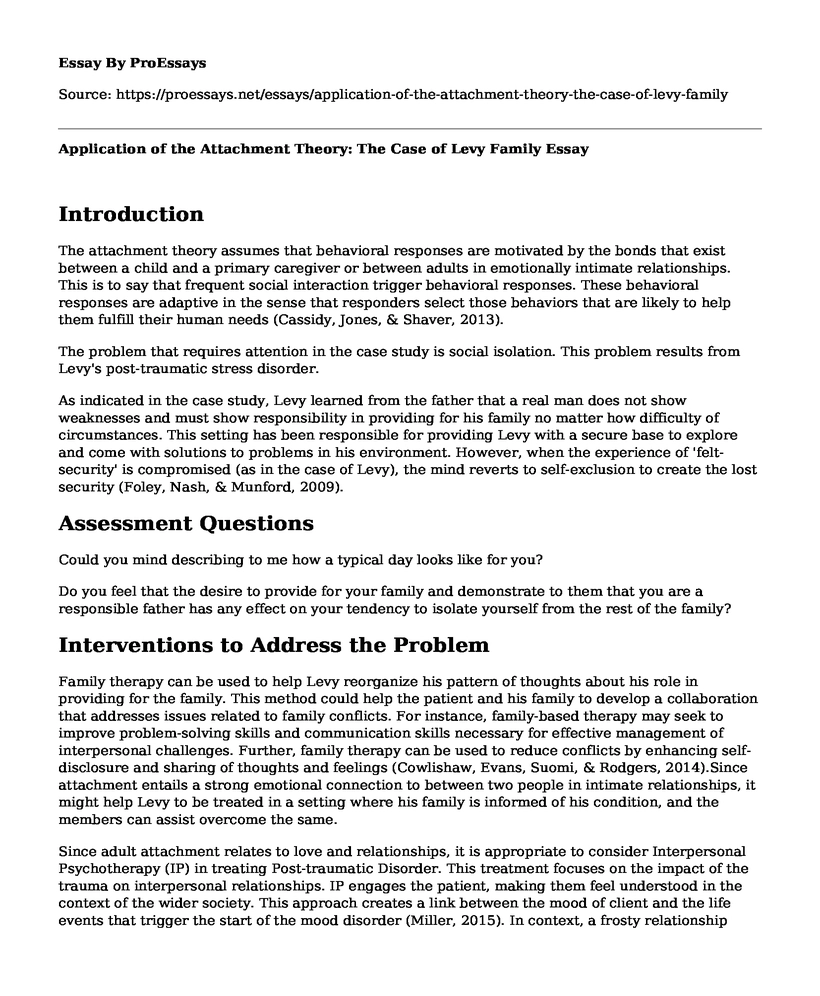Introduction
The attachment theory assumes that behavioral responses are motivated by the bonds that exist between a child and a primary caregiver or between adults in emotionally intimate relationships. This is to say that frequent social interaction trigger behavioral responses. These behavioral responses are adaptive in the sense that responders select those behaviors that are likely to help them fulfill their human needs (Cassidy, Jones, & Shaver, 2013).
The problem that requires attention in the case study is social isolation. This problem results from Levy's post-traumatic stress disorder.
As indicated in the case study, Levy learned from the father that a real man does not show weaknesses and must show responsibility in providing for his family no matter how difficulty of circumstances. This setting has been responsible for providing Levy with a secure base to explore and come with solutions to problems in his environment. However, when the experience of 'felt-security' is compromised (as in the case of Levy), the mind reverts to self-exclusion to create the lost security (Foley, Nash, & Munford, 2009).
Assessment Questions
Could you mind describing to me how a typical day looks like for you?
Do you feel that the desire to provide for your family and demonstrate to them that you are a responsible father has any effect on your tendency to isolate yourself from the rest of the family?
Interventions to Address the Problem
Family therapy can be used to help Levy reorganize his pattern of thoughts about his role in providing for the family. This method could help the patient and his family to develop a collaboration that addresses issues related to family conflicts. For instance, family-based therapy may seek to improve problem-solving skills and communication skills necessary for effective management of interpersonal challenges. Further, family therapy can be used to reduce conflicts by enhancing self-disclosure and sharing of thoughts and feelings (Cowlishaw, Evans, Suomi, & Rodgers, 2014).Since attachment entails a strong emotional connection to between two people in intimate relationships, it might help Levy to be treated in a setting where his family is informed of his condition, and the members can assist overcome the same.
Since adult attachment relates to love and relationships, it is appropriate to consider Interpersonal Psychotherapy (IP) in treating Post-traumatic Disorder. This treatment focuses on the impact of the trauma on interpersonal relationships. IP engages the patient, making them feel understood in the context of the wider society. This approach creates a link between the mood of client and the life events that trigger the start of the mood disorder (Miller, 2015). In context, a frosty relationship exists between Levy and the wife and children. This approach would help Levy open up with the family regarding his obsession to remain as head of the family through the provision of human needs.
What does Jake Levy need in order to provide him with the conditions necessary for him to experience a sense of belonging with his family?
In evaluating the therapy outcomes of the case scenario, it could be helpful to use feedback from the family members of Levy on his progress on communication skills and the willingness to share his nightmares of war. Such approach can help in modifying the current therapy interventions. Moreover, the social worker can use reflective practice to make a well thought-out analysis of the progress of Levy in so far as recovery is concerned.
References
Cassidy, J., Jones, J. D., & Shaver, P. R. (2013). Contributions of attachment theory and research: A framework for future research, translation, and policy. Development and Psychopathology, 25(4pt2), 1415-1434. doi:10.1017/s0954579413000692
Cowlishaw, S., Evans, L., Suomi, A., & Rodgers, B. (2014). Couple and family therapies for post-traumatic stress disorder (PTSD). Cochrane Database of Systematic Reviews, 1-15. doi:10.1002/14651858.cd011257
Foley, M., Nash, M., & Munford, R. (2009). Bringing practice into theory: Reflective practice and attachment theory. Aotearoa New Zealand Social Work Review, 21(1/2), 39-47.
Miller, M. D. (2015). Overview of basic principles of interpersonal psychotherapy. Oxford Clinical Psychology, 3(3), 136-139. doi:10.1093/med:psych/9780195382242.003.0002
Cite this page
Application of the Attachment Theory: The Case of Levy Family. (2022, Apr 07). Retrieved from https://proessays.net/essays/application-of-the-attachment-theory-the-case-of-levy-family
If you are the original author of this essay and no longer wish to have it published on the ProEssays website, please click below to request its removal:
- Getting Better Sleep Essay
- Happiness During American Suburbanization Essay
- Essay on Offer Learning Opportunities to Specific Needs
- Essay Sample on Role of Nurses in the Recovery Process of PTSD Patients
- The Approach to Love and Date Subscription Box by The Left and Right Hemispheres
- Essay Example on Leadership Philosophy: Guiding Principles for Success
- Diagnosing Autism Spectrum Disorder: Clinical Lengths - Essay Sample







